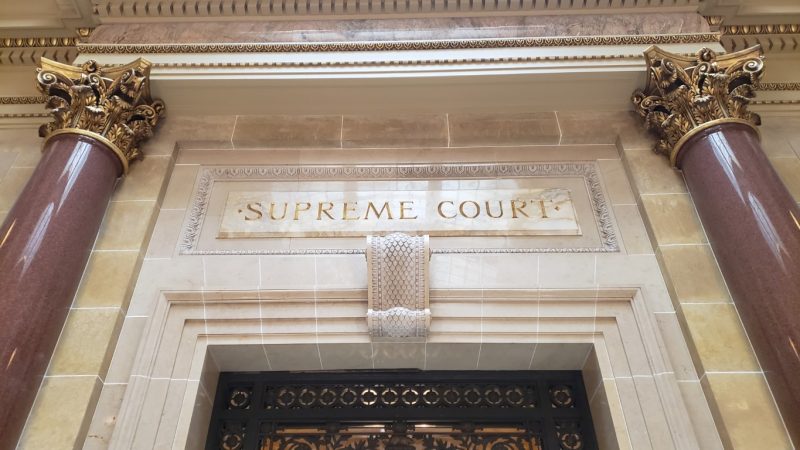A split state Supreme Court today ruled Gov. Tony Evers exceeded his authority in issuing multiple public health emergencies over the ongoing COVID-19 pandemic, striking down the foundation for his latest mask mandate.
Justice Brian Hagedorn, in the majority opinion, wrote that state law on public health emergencies forbids guvs from “proclaiming repeated states of emergency for the same enabling condition absent legislative approval.”
“The question in this case is not whether the Governor acted wisely; it is whether he acted lawfully. We conclude he did not,” Hagedorn wrote.
The 4-3 ruling comes just before Evers’ latest mask mandate was set to expire Monday, the same day all Wisconsinites age 16 and over will be eligible to receive the COVID-19 vaccine. It also comes as the state has warned about signs of a new surge in cases. Wisconsin reported 588 COVID-19 cases yesterday, bringing the seven-day average to the highest it’s been since March 4 — 501 cases per day.
>> WisPolitics is now on the State Affairs network. Get custom keyword notifications, bill tracking and all WisPolitics content. Get the app or access via desktop.
Reacting to the ruling, Evers urged Wisconsinites to continue wearing masks. While the ruling struck down the statewide order, it doesn’t impact directives from local health officials.
“Our fight against COVID-19 isn’t over — while we work to get folks vaccinated as quickly as we can, we know wearing a mask saves lives, and we still need Wisconsinites to mask up so we can beat this virus and bounce back from this pandemic,” Evers said.
Meanwhile, Senate Majority Leader Devin LeMahieu, R-Oostburg, praised the court for “ending this constitutional crisis in our state.”
“Today’s ruling vindicates the Legislature as a co-equal branch of government and will expand freedom and opportunity for the people of Wisconsin,” LeMahieu said. “As we work to fully and safely reopen our state, we trust our residents to follow CDC guidelines when appropriate, get vaccinated when ready, and always employ common sense.”
State law gives governors the power to declare a public health emergency that lasts for up to 60 days unless the Legislature approves an extension. Evers issued his first public health declaration March 12, 2020, as the COVID-19 pandemic took hold in the state. He subsequently issued a stay-at-home order. Once that was about to expire, his Department of Health Services secretary issued a second directive that the state Supreme Court later overturned, ruling she had exceeded her authority under state law.
Evers then issued a new public health emergency on July 30 that served as the foundation for his first statewide mask mandate and subsequently issued additional orders to continue the requirement that Wisconsinites wear face coverings in public. In doing so, Evers argued there were unique occurrences related to the pandemic that justified the new orders after his original one expired. That includes a spike in cases last year.
The Legislature in February voted to overturn one of Evers’ declarations, but he immediately issued a new one that served as the foundation for another mask mandate that was set to expire Monday.
Waukesha businessman and GOP donor Jere Fabick challenged the July and September declarations with his suit, and the majority declared them unlawful. It also overturned the February order, which was issued while the court was still working on the ruling following oral arguments in November.
Hagedorn noted one of the justifications Evers offered for quickly issuing another public health emergency after GOP lawmakers’ February actions was the potential loss of about $50 million a month in enhanced federal funding for food stamps. To qualify, states must have a public health emergency declaration in place.
But he wrote that condition existed ahead of the Legislature revoking his order.
“The Governor cannot make an end run around legislative revocation simply by itemizing a previously unidentified justification for the state of emergency,” Hagedorn wrote. “Reading the statute to encourage a game of whac-a-mole between the governor and legislature would defeat Wis. Stat. § 323.10’s explicit legislative check on the governor’s emergency power.”
Hagedorn wrote the guv’s power “to act unilaterally on an emergency basis is limited by both a 60-day limit and by the legislature’s power to terminate the emergency declaration.”
Hagedorn was joined by fellow conservatives Rebecca Bradley, Pat Roggensack and Annette Ziegler in his decision.
In her dissent, Justice Ann Walsh Bradley wrote the majority had placed “yet another roadblock to an effective governmental response to COVID-19, further jeopardizing the health and lives of the people of Wisconsin.”
Bradley argued the majority had erred in allowing Fabick to file the lawsuit simply because he is a taxpayer. She wrote Fabick had not met the long-established requirement of showing he had suffered any losses due to the order to file the lawsuit.
She also knocked the majority for a “final flourish of judicial immodesty” by striking down Evers’ February public health declaration with “scant analysis and without candid justification.”
What’s more, she wrote Evers’ orders were legal under Wisconsin law because they dealt with separate “occurrences” related to the pandemic, including the potential loss of the federal FoodShare funds that require a public health declaration to be in place to qualify for the money. She called it, “An absurd result indeed.”
Bradley was joined by fellow liberals Rebecca Dallet and Jill Karofsky.
Read the decision.



